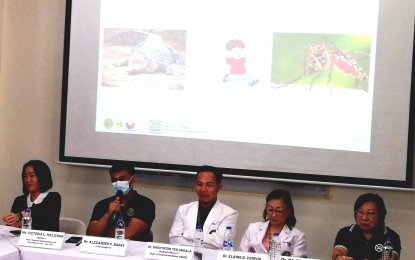
PREVENTING DENGUE. Department of Health-Cordillera entomologist Alexander Baday (second from left) explains the factors that will help prevent the spread of dengue-carrying mosquitoes. He said people should be responsible in cleaning their surroundings to ensure that all possible breeding grounds of mosquitoes will be eradicated. (PNA photo by Liza T. Agoot)
BAGUIO CITY – The Department of Health (DOH) said cleaning surroundings to get rid of mosquito breeding places has been proven to be the most efficient and cost-effective way of preventing the transmission of dengue particularly during the rainy season.
“It is difficult to identify whether it is Aedes aegypti mosquito or any kind of mosquito. The best protection is to prevent any mosquito from breeding by cleaning and ensuring that possible breeding places are not established,” said Alexander Baday, entomologist of the DOH-Cordillera Administrative Region (CAR), in a briefing here on Thursday.
DOH data show a 26 percent increase in dengue cases from January to May this year to 2,122 from the 1,680 cases during the same period last year. There were three deaths for both periods.
Baday said an uptrend has been observed in the past two weeks after cases rose by 72 percent.
He said clustering of cases was reported in 27 villages in Benguet, 20 in Baguio City, 18 in Mountain Province and one in Ifugao.
“The different local government units have been doing fogging operations in areas where there were clustering of cases to prevent further transmission,” he said.
He explained that “control and prevention of dengue is dependent on the community’s participation.”
“It is the community members who live in the barangays and whether there are mosquito breeding grounds will depend on them. Cleaning of surroundings is still the best measure against dengue,” he said.
He said “Oplan Taub (upside down)”, or in this case putting any container upside down to prevent the collection of water; larvae surveillance; and information and education campaigns must be sustained.
“We need everyone’s participation,” he reiterated.
Targeting the children
Baday said DOH provides technical assistance to schools on top of the distribution of anti-mosquito-curtains and nets for classroom windows.
With the help of Rural Health Unit personnel, he said DOH conducted information campaigns in schools to inform children of the need to protect themselves by wearing long sleeved shirts and pants and to properly dispose of their trash, especially bottle caps.
“The children are the most at risk, with cases showing even newborn babies being affected,” he added. (PNA)
 The Philippine News Agency is a web-based newswire service of the Philippine government under the supervision of the News and Information Bureau (NIB) of the Presidential Communications Office (PCO).
The Philippine News Agency is a web-based newswire service of the Philippine government under the supervision of the News and Information Bureau (NIB) of the Presidential Communications Office (PCO).